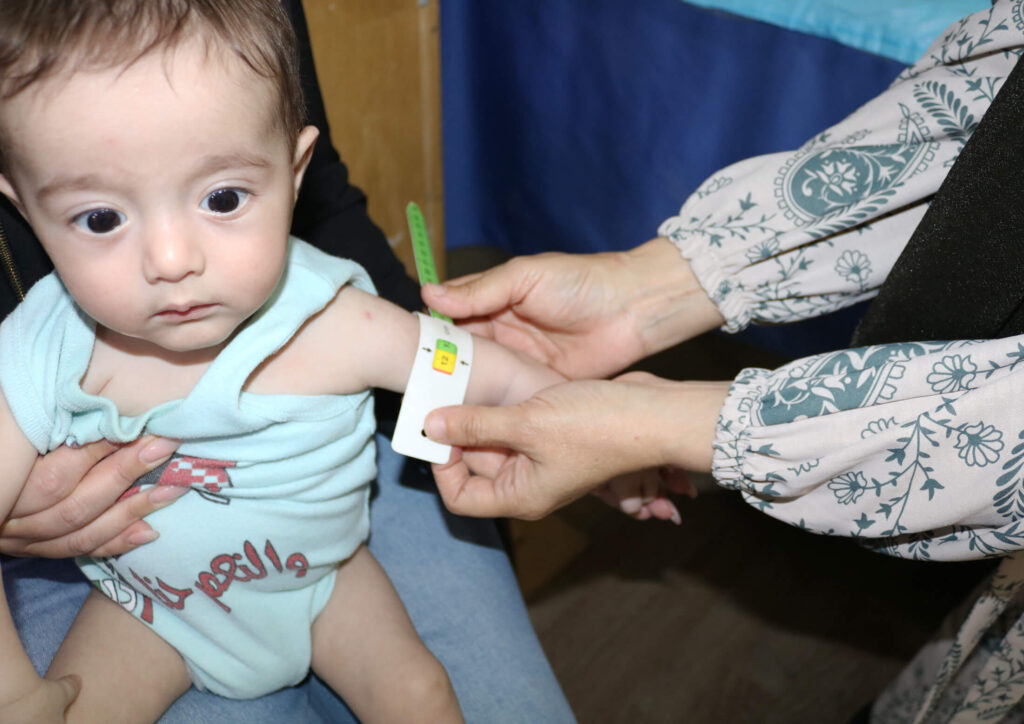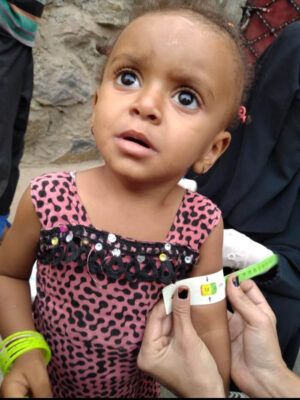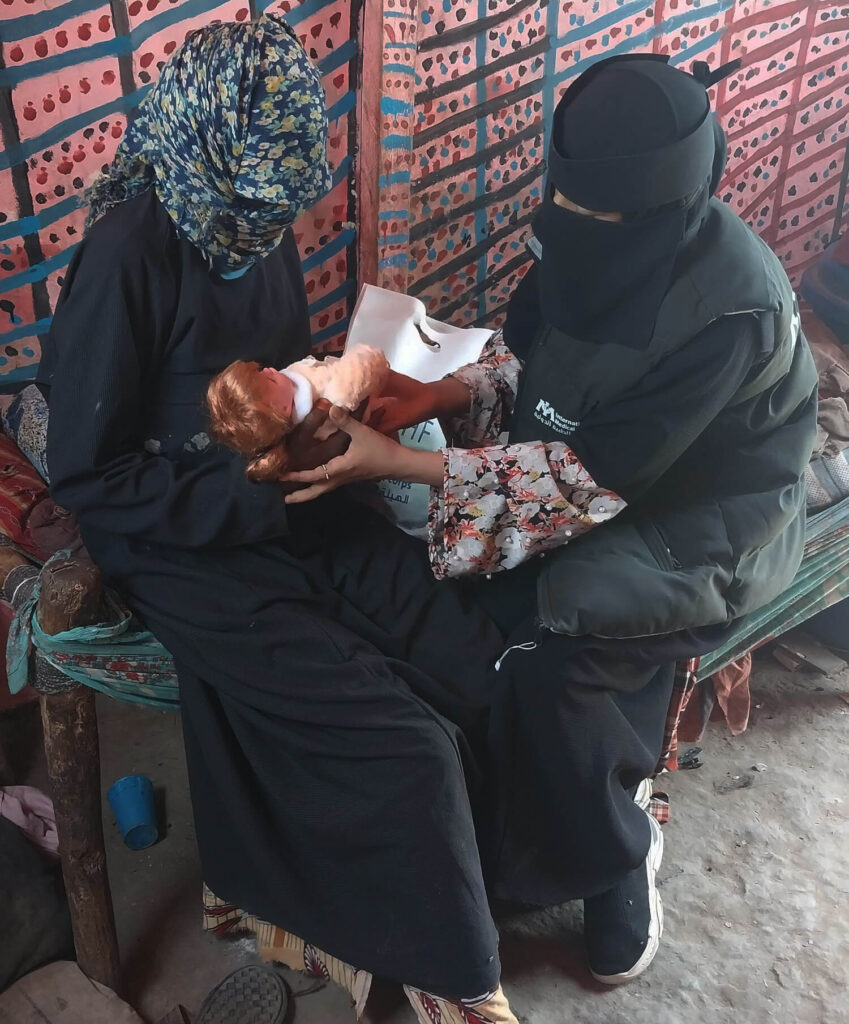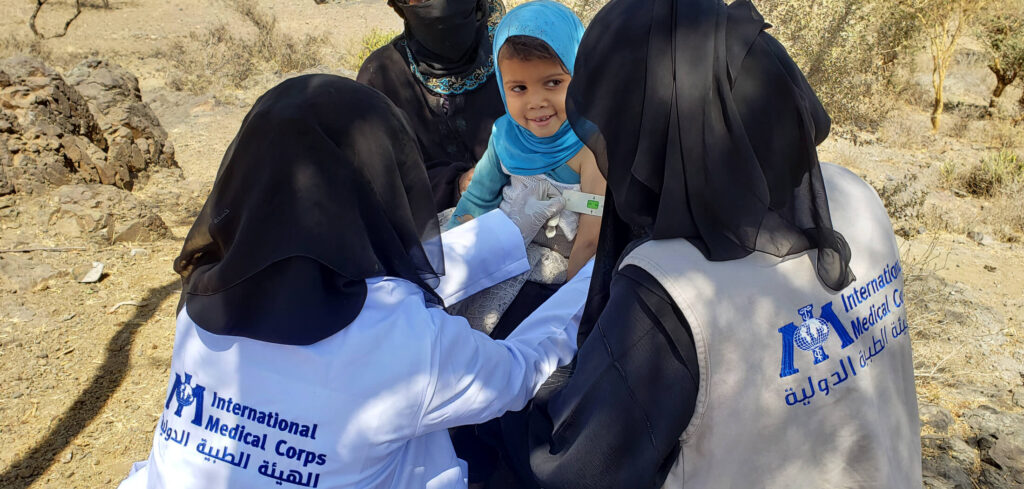Imagine a child so weak from malnutrition that she forgets to smile. She sits on her bed, staring into space, unable to walk or play. This was 4-year-old Fatima, from a remote village in Hays district in Yemen. She was suffering from acute malnutrition bordering on the severe category. Her mother suffered along, watching helplessly as her daughter’s childhood slowly slipped away before her eyes.
When International Medical Corps Community Health and Nutrition Volunteer (CHNV) Wad Najeeb visited Fatima for the first time during her routine door-to-door assessment, Fatima’s mid-upper arm circumference (MUAC) measured 11.8 centimetres. The normal MUAC of a girl Fatima’s age is 13.5 cm. Though the CHNV encouraged Fatima’s mother to take her to the nearest health facility for nutrition care and support, she was reluctant due to personal reasons. When Wad revisited Fatima a month later, her MUAC had slipped to 11.2 cm, which shocked Wad. She started an emergency nutrition rehabilitation plan for Fatima, and advised her mother to prepare her child’s meals using locally available ingredients, such as lentil soup with a spoonful of oil and milk products, and clean and boiled water. Her timely action and support prevented Fatima from becoming another statistic in the growing number of malnutrition-related deaths in Yemen.
More than 2,600 kilometres away, in Jordan’s Zaatari refugee camp, a 6-month-old malnourished baby visited International Medical Corps Nutrition Clinic with his mother. Hamida Alayan Al-Mohammed, 43, who works in the clinic as a Nutrition Volunteer, assessed the extremely weak child and noticed that he neither laughed nor played. Suspecting a health problem, she referred him to a paediatrician who discovered that the child had a heart defect and needed urgent surgery. The referral and Hamida’s swift action made a huge difference. The surgery was successful, and the baby is recovering.

Another neighbour came to Hamida seeking help because her baby refused to breastfeed. When Hamida tried to help, she saw that the baby’s mouth was full of thrush, a painful fungal infection. Based on her training, Hamida advised the mother to see a paediatrician and apply an antifungal cream to the lesions to reduce the baby’s pain and discomfort while nursing. The mother paid heed and, within a few weeks, the oral thrush disappeared. The baby could comfortably breastfeed.
Rula Mohammad often works with young mothers as a Nutrition Volunteer in Jordan’s Azraq refugee camp. She visits homes and conducts awareness sessions for mothers about breastfeeding, proper positioning, milk expression and correct latching techniques. “A first-time mother once visited us with cracked nipples on both her breasts,” Rula says. “Her baby couldn’t latch properly, and she was in pain. We taught her how to properly breastfeed and express milk. We also used a nipple shield and placed it on her breast, which helped the baby latch well.” Rula had to work with the young mother for a considerable period before her baby started breastfeeding independently. With continued guidance, the mother managed to breastfeed her daughter until she was 2.


Supporting Mothers in Yemen
International Medical Corps CHNVs aren’t just staff going door to door conducting routine assessments. They are guides and trusted sources of health information for millions of women in Jordan and Yemen, where the respective burdens of refugee influx and longstanding conflict have limited women’s access to healthcare. The situation is more challenging in Yemen, where limited awareness of nutrition and feeding practices, harmful traditional beliefs, early marriage and widespread poverty have given women little choice in matters of health and nutrition.
Take the case of Jamila Ahmed Ali Baghili, who married at 22. When she gave birth to her first child, her family made her follow rigid customs with her baby, such as feeding the baby goat’s milk and ghee (clarified butter) to “strengthen the stomach.”
“I was terrified,” Jamila says. “I knew breastfeeding was best, but I felt powerless to oppose my family.” Overwhelmed and frightened about her child’s health, Jamila acted quickly—she contacted International Medical Corps’ midwife and CHNV, who intervened. After several difficult conversations and much persuasion, Jamila’s family agreed to let her breastfeed her child. “The support from the midwife gave me the strength to stand up for my baby,” she says.
Jamila is not alone in her struggle. Jehadah Khalid, a young mother in Hays district, faced constraints such as harmful social norms, limited autonomy, family pressure and restricted access to health information. Her situation changed when she met Hana, a CHNV working with International Medical Corps. Hana started visiting Jehadah during her pregnancy as part of our community outreach efforts, and provided her with nutrition education. Through these sessions, Jehadah learned about the lifesaving benefits of exclusive breastfeeding (EBF). With Hana’s encouragement, Jehadah committed to giving her baby a healthy start despite her family pressuring her not to breastfeed, as they believed breast milk alone wasn’t nutritionally sufficient for the baby.


When Jehadah gave birth, Hana helped her initiate breastfeeding within the first hour—an achievement, given the baby’s struggle to latch properly because of an inverted nipple and the psychosocial pressures Jehadah faced. However, shortly after giving birth, conflict at home escalated, forcing Jehadah to leave her in-laws’ house and return to her family. This domestic instability—a common risk for women in conflict settings—resulted in an abrupt interruption of her breastfeeding journey. For nearly a month, she was disconnected from supportive services and, under family pressure, began using infant formula.
But Hana did not give up hope. When Jehadah returned to her in-laws after a month, following a resolution of her domestic conflict, Hana re-engaged with her, offering continued support and reassurance. Through regular visits and protection-sensitive counselling, Hana helped rebuild Jehadah’s trust. She enabled her to resume EBF, gradually reducing her baby’s reliance on formula milk and managing pain through better positioning and latching techniques. With determination, support and the power of information, Jehadah overcame physical discomfort, social stigma and emotional roadblocks to give her child the best possible start to life.
Strengthening Communities with Skills and Knowledge
Nutrition is pivotal to a child’s development—especially during the first 1,000 days, which covers the period from conception until age 2. Poor nutrition during this window can impair physical and cognitive development, keeping a child from reaching full potential. Moreover, malnutrition contributes to nearly half of the deaths among children under 5. It increases healthcare costs for families, reduces the productivity of communities and has even been shown to slow national economic growth. That is why International Medical Corps is committed to alleviating malnutrition in all its forms through quality nutrition programming.
Our CHNVs play a critical role in promoting, protecting and supporting optimal infant and young-child feeding (IYCF) practices. In Yemen, we build the skills and knowledge of the CHNVs through basic training that is aligned with national guidelines of the Ministry of Public Health and Population, focusing on maternal, infant and young-child nutrition in emergencies. We help CHNVs conduct awareness sessions where they deliver key messages about the importance of breastfeeding, early initiation within the first hour of birth and EBF for the first six months.
A key component of our nutrition programming is the establishment of IYCF spaces, where women receive one-on-one counselling, peer support and protection services. These safe spaces help mothers like Jamila gain the knowledge, confidence and social support needed to adopt healthier feeding practices.


In Jordan, International Medical Corps remains the primary agency implementing nutrition programmes through four nutrition clinics across the Azraq and Zaatari refugee camps. Besides receiving cases at the clinics, the CHNVs conduct home visits to address misconceptions around breastfeeding and jaundice treatment. “Many mothers give sugary water to their babies below 6 months suffering from jaundice,” Rula says. “We explain to them why that’s not advisable, and why exclusive breastfeeding is the only thing that helps.” She explains how families’ perceptions changed after she had provided them with awareness sessions. “Many mothers used to think their milk wasn’t enough for their babies, so they resorted to formula,” she says. “We would tell them the more they breastfed, the more milk they would produce.”
The CHNVs also explain to caregivers the importance of MUAC measurements. “During the COVID-19 pandemic, we trained parents to measure the mid-upper arm circumference of their child,” Rula adds. “We taught mothers and gave them MUAC tapes, so they could measure themselves.”

According to Hamida, other skills and knowledge that the CHNVs pass on to the community—especially mothers—include the do’s and don’ts of appropriate complementary feeding, testing for allergies and stressing the importance of different dietary sources for a mother to increase milk production.
Years of Learning and Training
Many of our CHNVs develop deep expertise in nutrition while volunteering with International Medical Corps. The CHNVs undergo multiple levels of training—both theoretical and practical—and years of field work.
In Yemen, we conduct basic and refresher training for the CHNVs in coordination with the district and governorate health offices. The leaders of our health and nutrition programmes conduct monthly reviews of the training and guidance provided, which covers topics and scenarios such as:
- nutrition screening using MUAC;
- referrals of acute malnutrition cases;
- community health and nutrition education;
- raising awareness about breastfeeding;
- preventing noncommunicable diseases such as cholera, malaria and diarrhoea;
- emphasising the importance of personal hygiene and environmental health;
- referring emergency cases; and
- providing psychological first aid in emergencies.
Some CHNVs also attend a course on becoming a mother-to-mother support-group leader, while others receive training on reproductive health and immunisation.
Hayat Muhammad, a CHNV in Yemen who has worked with International Medical Corps since 2014, has gained knowledge and experience in dealing with infectious and noncommunicable diseases. “I’m also capable of carrying out essential therapeutic measures, such as preparing an oral rehydration solution to treat dehydration caused by diarrhoea, and preparing a sugar solution to help stabilise cases of malnutrition until a patient reaches the nearest health facility,” she says.
In Jordan, one must pass an oral or written exam to qualify for the role of a CHNV. Those selected undergo intensive training for a full day, sometimes two. The training has two segments—one focuses on IYCF, including topics such as the importance of EBF, advice to increase milk supply and follow-up with pregnant and lactating women (PLWs); the other focuses on following up on malnutrition cases, including taking MUAC measurements of children under 5 and PLWs, and referring a child to the nutrition clinic in case of severe or moderate malnutrition. Our nutrition officers conduct this training.

Reflecting on her journey with International Medical Corps, Rula admits that she knew very little when she joined the organisation in 2017. “At first, I didn’t know much about breastfeeding, but over time, I gained a lot of knowledge from the nutrition officer,” she explains. “I learned how a mother should breastfeed and what she should do if the baby cannot latch; I learned about the different foods that a caregiver can introduce at 6 months and those that must be avoided until a baby turns 1. I became capable of dealing with almost any case assigned to me.”
Giving Back to Community
The CHNVs pass on the knowledge and skills they gain to caregivers in their community, helping break the chain of traditional beliefs and harmful feeding practices, and correcting misconceptions related to child nutrition. “When mothers question us, we try to provide scientifically accurate answers,” says Hamida. “Many mothers in my village now use the MUAC approach to screen their children for malnutrition,” Hayat says.
In Jordan’s refugee camps, mothers have started visiting our nutrition clinics more regularly, and families are now turning to nutrition experts. “With our regular training and awareness sessions, the community is becoming more open to changing misconceptions and bad habits,” Hamida says.
For women like Jamila, the association with CHNVs does not end with birth and breastfeeding. Always curious and eager to learn, Jamila continued to visit the IYCF corner in the Basmat Amal Health Facility, which we support. With regular follow-up and guidance from the IYCF counsellor and community volunteer, she gradually gained knowledge about maternal nutrition, EBF and appropriate complementary feeding, and applied this knowledge to support other women in her village. She also tested this knowledge during her third pregnancy—attending routine antenatal appointments, initiating breastfeeding within the first hour of birth and practising EBF for the first six months. The positive outcome was evident in her child’s health—the baby did not suffer from frequent illnesses or require clinical visits.
The work of the CHNVs helps to ensure a solid nutritional foundation for babies and PLWs, creating strong and healthy communities in the long run. But what motivates our volunteers to work hard every day? “Fatima became a symbol of hope for us,” says Wad. “When she survived, we knew that every step we take, and every awareness session we provide, may give life to someone.”
Learn more about our nutrition programme, and donate to International Medical Corps to support our lifesaving work worldwide.
